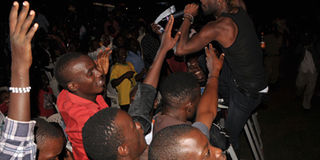Mukono acquires meter to check noise pollution

Noise. An artiste performers at a concert in Kampala last year. Mukono Municipality authorities have procured a sound level meter devise to help cub noise pollution in the town. FILE PHOTO
What you need to know:
- Evidence. Authorities say the noise metre will provide them with evidence of noise polluters in the municipal court.
- The National Environment (Noise Standards and Control) Regulations 2003, empowers local councils to make laws regulating noise and vibration pollution in accordance with the Local Governments Act.
Mukono. In an effort to control the increasing noise pollution in Mukono Municipality, authorities have procured a sound level meter to help measure the volume of noise made in the town.
According to Mr George Fred Kagimu, the Mukono Municipality mayor, the noise meter will provide them with evidence of noise polluters in the municipal court.
Shs5m has so far been spent on the noise meter device.
“Acquiring a sound level meter is a good step as we strive to fight noise pollution in the town. Some residents have been complaining that we falsely accuse them of going beyond the permissible noise levels because we lacked the machine, but now we shall have evidence to disprove them,” he said during an interview on Wednesday.
Last year, the municipal council passed an ordinance that banned noise at ceremonies such as wedding parties and public gatherings beyond midnight.
The law also bars event organisers from playing loud music beyond the maximum permissible noise levels as they move around the town to publicise their events.
Mr Kagimu said although they have made some progress, noise pollution is still an issue in the municipality since some people have failed to adhere to the guidelines issued to them.
Mr Kagimu said they want to be more vigilant in enforcing both noise and environment pollution laws because many factories have sprung up in the area thus threatening to pollute the nearby water sources where residents draw water for domestic use.
The National Environment (Noise Standards and Control) Regulations 2003, empowers local councils to make laws regulating noise and vibration pollution in accordance with the Local Governments Act.
The deputy mayor of Mukono Municipality, Mr Jamada Kajjoba, said they have so far arrested two people over noise pollution and they will be charged with producing unnecessary noise in the area.
“We have been sensitising people, including religious leaders, on noise pollution and some have cooperated and installed sound proofing systems,” Mr Kajoba said.
Mr Kajoba also said during the numerous meetings they have held with religious leaders in the area, the latter gave them assurance that noise emanating from places of worship during night prayers would drastically reduce for those who have not yet installed sound proofing systems.
Residents speak out
Ms Margaret Nabirye, a businesswoman in Mukono Town, said although controlling noise pollution is good, the authorities will find an uphill task to enforce the ordinance, especially among born-again churches since most of their followers pray throughout the night.
“It is a good idea to get a noise meter for those who mount loud speakers on trucks and move around town because they were overdoing it, but for pentecostal churches, I doubt whether it will work. Many of us get busy during day time and we go to church at night,” she said.
Medical doctors have previously warned that getting exposed to excessive noise for more than six hours daily, makes one get health-related problems such as headaches, heart failure, deafness and cancer, among others.
They also warn that constant exposure to loud sound beyond 80 decibels (noise pollution) can affect the ears, thereby causing temporary or permanent hearing loss.
Measuring sound
Sound is measured in decibels (dB). The range that is safe for a human’s ears should be under 85 dB.
In residential areas, the permissible noise levels for discotheques, places of workshop and construction sites are 60 dB during day and 40 dB at night, while in commercial areas, it is 75 dB during day and 50 dB at night. For industrial areas, it is 85 dB during day and 65 dB at night.



